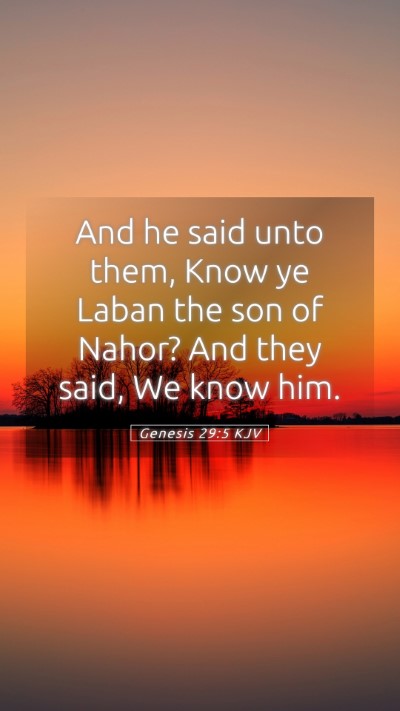Understanding Genesis 29:5 - Bible Verse Commentary
Genesis 29:5 states: "And he said unto them, Know ye Laban the son of Nahor? And they said, We know him." This verse occurs during the journey of Jacob, who is seeking a wife from his mother's family. To gain a deeper insight into the meaning of this verse, we will utilize insights from renowned public domain commentaries including those of Matthew Henry, Albert Barnes, and Adam Clarke.
Bible Verse Meanings and Interpretations
In this verse, Jacob encounters shepherds at a well and inquires about their knowledge of Laban, his uncle. The response signifies not only recognition but also sets the stage for Jacob's future interactions with Laban.
Analysis from Matthew Henry
Matthew Henry emphasizes the importance of familial connections in the Biblical narrative. Jacob is portrayed not merely as a wanderer but as one who is actively seeking ties and establishing his future. Henry notes that this moment highlights God's providence; Jacob is on a divine mission to find not just a wife but to continue the covenant line through his family.
Insights from Albert Barnes
Albert Barnes discusses the historical context of Laban’s lineage, linking it to Abraham’s family. He points out that Jacob's inquiry about Laban reflects his desire to connect with his heritage, reinforcing the significance of one's ancestry in the Scriptural context. Barnes suggests that Laban represents both a familial support and a future challenge for Jacob, especially considering Laban's reputation for trickery.
Commentary by Adam Clarke
Adam Clarke adds depth to the dialogue at the well by highlighting the social customs of the time. The encounter at the well symbolizes more than a simple question; it showcases the importance of community and the expectations of hospitality in ancient societies. Clarke also hints at the prophetic nature of Jacob’s journey, foreshadowing the significant events that will unfold with Laban.
Scripture Analysis & Biblical Exegesis
The dialogue that unfolds in Genesis 29 serves multiple theological purposes. It establishes Jacob's identity as a member of Abraham's family and signifies the connections that God has woven into the narrative of redemption.
- Thematic Understanding: The interactions between Jacob and the shepherds encapsulate themes of quest and identity.
- Connection to Covenant: By asking about Laban, Jacob aligns himself with the promised lineage through Isaac, setting the course for God's covenantal relationship with His people.
Bible Study Insights
This verse can serve as a focal point for Bible study groups and online Bible study sessions, providing a basis for discussing themes of family, identity, and divine providence. Here are some potential Bible study topics related to this verse:
- Understanding familial roles in the Bible
- The significance of lineage in the context of God’s promises
- How ancestral connections affect our understanding of personal identity
Meaning of Bible Verses & Application
In applying Genesis 29:5 to daily life, believers can consider the importance of maintaining connections with their own family and heritage. This verse challenges readers to reflect on their own journeys and the role of divine guidance in their family stories.
- Self-Reflection: Engage in self-examination regarding one’s own family ties.
- Prayer: Ask for guidance in nurturing those family relationships.
Cross References
The following Bible verses relate closely to Genesis 29:5, illuminating aspects of Jacob’s story and family dynamics:
- Genesis 24:28-31: Abraham’s servant seeks a wife for Isaac.
- Genesis 25:26: The birth of Esau and Jacob, establishing their foundational roles.
- Genesis 28:10-12: Jacob's journey and divine encounter at Bethel.
Conclusion
Genesis 29:5 is rich with implications regarding heritage, providence, and the unfolding of God’s plans. By leveraging public domain commentaries and engaging in Bible study resources, believers can gain a deeper appreciation of how this verse informs our understanding of Scripture and our own lives.


